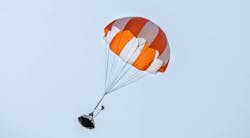In April 2016, I wrote about drones in construction and suggested – half-jokingly – that HVAC techs might soon be seeing their parts delivered to the jobsite via drone. Well, now a start-up in Los Angeles wants to ratchet it up a notch, and make deliveries from space.
Founded in January 2021 by two propulsion engineers, Inversion Space pitched the Y Combinator Demo Day on Sept. 1 last year, and by Nov. 16, had already secured $10 million in seed funding. For those not familiar with it, Y Combinator provides seed funding – the earliest stage of venture funding – at the beginning of a start-up’s life in order to pay its initial expenses.
Inversion Space’s vision isn’t to be another SpaceX or Blue Origin, although it does want to deliver cargo to space stations and satellites that can be used for storage. The difference is, Inversion also wants to be able to bring the cargo back to earth, in less than an hour, when and where it’s needed. Most of the cargo being flown into space on rockets today is either satellites to be placed in orbit or supplies and materials required by the International Space Station.
In neither case is there a need to bring the cargo back, however. As a result, the focus has been on outbound launches, not on return options. Inversion points out that today’s space cargo vehicles were designed to NASA’s requirements, but that commercial space flight operations require more flexible options.
According to its website, Inversion plans to launch “Ray,” its 18-in-diameter demonstration capsule next year and follow up with “Arc”, a 4-ft-diameter working capsule, in 2025. The capsules will return to earth using Inversion-designed and manufactured parachutes, and potential customers for the company’s capsules would be both commercial and government entities. The U.S. military, for example, could store supplies in orbit and use the capsules to deliver them anywhere in the world. Once in orbit, the Inversion capsules could also serve as orbital platforms for conducting missions and, perhaps in the future, space mining operations.
So once again, somewhat more seriously this time, let me suggest that – in the not too distant future – we actually may have parts delivered to our jobsites by drones and space capsules! What would grandma – or Dr. Gorrie – make of that?
A regular contributor to HPAC Engineering and a member of its editorial advisory board, the author is a principal at Sustainable Performance Solutions LLC, a south Florida-based engineering firm focusing on energy and sustainability. He can be reached at [email protected].
About the Author
Larry Clark
A member of HPAC Engineering’s Editorial Advisory Board, Lawrence (Larry) Clark, QCxP, GGP, LEED AP+, is principal of Sustainable Performance Solutions LLC, a South Florida-based engineering firm focused on energy and sustainability consulting. He has more than two dozen published articles on HVAC- and energy-related topics to his credit and frequently lectures on green-building best practices, central-energy-plant optimization, and demand-controlled ventilation.
